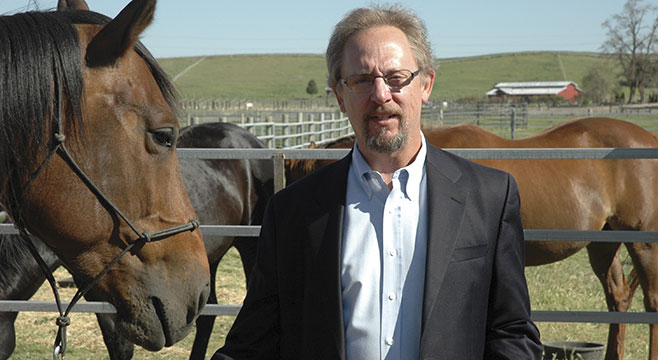
After donating his yak farm and moving to Walla Walla, Washington, Dr. Tom Koehler still finds time to enjoy nature.
Consider a set of circumstances: You’re sick of pumping iron at the gym. You’d like to exercise with a purpose. You’re ruminating on it all during a fishing trip with your brother in Belize.
“I wouldn’t mind having a farm where you mend fences and bale hay,” Dr. Tom Koehler told his brother on that fateful trip. The idea blossomed into the Green Bay Yakkers, a yak ranch on Wisconsin’s Door County peninsula.
Koehler lived his dream, building fences and tossing hay bales, while living on a perfect piece of property. His vision changed, however, when he left his executive and board positions with Aurora Health in Green Bay and moved to Walla Walla, Washington, where he’s a hospitalist. For personal and financial reasons and with a desire to benefit the University of Wisconsin-Madison, he gave the ranch to the UW Foundation.
“It allowed me to walk away from that ranch with a smile on my face,” Koehler said, adding he was happy and proud that the sale of the ranch will help support students. “And it was easy,” he said.
Life with yaks and beyond
Koehler wasn’t a stranger to rural life. His family briefly lived on a farm, and he spent more time visiting his grandparents’ farm. He knew, however, that he wasn’t interested in raising animals as ordinary as cattle. Yaks, he learned, like cold weather and thrive in the harsh landscape of Tibet. They’d be perfect for Door County.
He established his fledgling ranch on rented land near Green Bay until he found a perfect parcel of land near Brussels, about 30 miles up the peninsula. He started from scratch, installing and building fences, a barn and a house. At one time he had 30 yaks, which weigh about 1,700 pounds for males and 650 pounds for females. The average cow, in contrast, weighs about 1,660 pounds.
These shaggy black beasts with black noses were Imperial yaks, as close to wild as Koehler could find. They provide a natural fiber, wool; they’re pack animals; and Tibetans make yak dairy products. In Door County, Koehler sold yak burger. A Nepalese restaurant in Madison was a regular customer for yak meat.
Koehler’s move to Washington made it tough to take care of a yak ranch in Wisconsin, and selling it was difficult. That’s where the UW Foundation came in.
An avid Badgers fan, Koehler had earned his master’s degree in preventive medicine and medical administration from the UW-Madison in 1996. He knew he wanted to make a significant gift to the university, and the ranch offered benefits on several fronts.
Once he made the decision, the process of turning the property over to the UW Foundation, which is the designated gift-receiving organization for the university, was easy, he said. He hopes the proceeds of the sale will benefit students interested in agriculture.
As for Koehler, he rides his bike and hikes during the summer but is back to the YMCA during winter months. “I’m now a city slicker,” he said.
